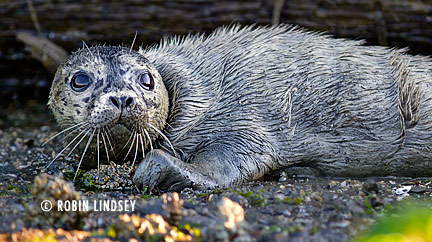Don't touch seal pups! Rash of illegal pickups endanger pups
Jul/14/13 07:12 AM

It is against Federal law, the Marine Mammal Protection Act, to touch, feed or move a seal pup. Violations are subject to stiff fines and can include jail time, depending on the severity of the crime.
One of the most common wrong assumptions that people make is thinking that a pup needs to be in the water, not on shore. Pups haul out to rest and warm up from our very frigid Northwest waters. Never return a pup to the water. They need to rest - on beaches, log booms, docks - even, occasionally, passing kayaks and paddle boards. Never cover a pup with a blanket - they can overheat and suffer brain damage.
During pupping season (June - September in South Puget Sound), it’s not unusual for a pup to suckle rocks or logs when mom isn’t around. The newborn pup shown here, with a long, white lanugo coat usually shed in the womb, was suckling on rocks and calling for mom, who returned to tend to her offspring. A newborn will still have a bit of the umbilicus cord protruding. It is not an “injury” as many people think and usually falls off after a week or so. If you see a pup you are concerned about, call the stranding network - don’t touch or try to feed the pup.
Share the shore. If you see a seal pup, stay back - 100 yards whenever possible. The best chance a pup has for survival is to stay in the wild, undisturbed by humans. If a pup is under 4-6 weeks old and is alone on the beach, almost always mom is nearby. If she sees people or dogs (a significant danger) too close, she may well abandon the pup who cannot survive without her. A pup taken to rehab does not have nearly the chance to make it back in the wild as a pup who remains there with mom, learning how to forage and gaining immunity from disease while nursing on her rich milk. Even then, pups have a 50% mortality rate their first year.
Never take a pup from the beach. Only members of NOAA’s Marine Mammal Stranding Network or NOAA authorized personnel can transport a marine mammal. A pup taken illegally from the beach to a wildlife facility, by law cannot be treated until approved by NOAA. While you may think you are saving a pup, instead you are gravely endangering him. Being removed from the beach, handled and put into a car can cause life threatening stress. Please don’t disturb resting seal pups. If you are concerned about the health of an animal or if there is harassment by people or dogs, call the NOAA hotline @ 800- 853-1964 or the Seal Sitters hotline @ 206-905-7325 (SEAL) and we will direct you to the proper standing network for response.







